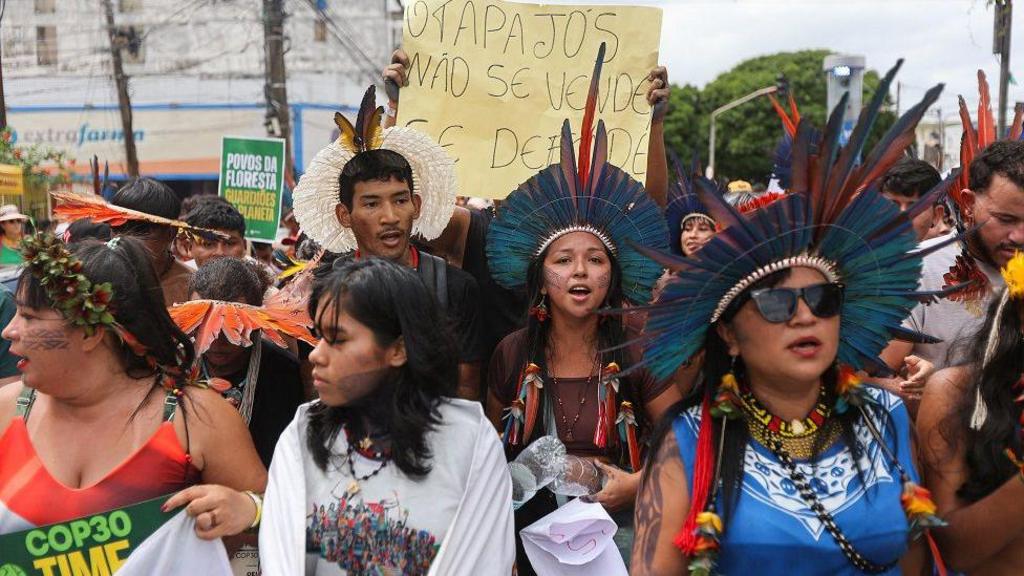Fueled by a pulsing sound system, throngs of climate activists have converged at the COP30 climate talks in Brazil to amplify their urgent message.
Demonstrators in Belém, the host city, chanted slogans such as “free the Amazon” while carrying three oversized coffins labeled Oil, Coal, and Gas, accompanied by figures dressed as grim reapers.
Indigenous groups displayed signs declaring “the answer is us,” as an inflatable elephant and anaconda moved through the crowd under the intense heat.
This marks the first instance since 2021 that protesters have been permitted to demonstrate outside the UN climate talks, as the preceding three summits were held in countries with restrictions on public protest.
“We are holding a funeral for fossil fuels,” Tuga Cíntia of the theatre group Hydra Dance, affiliated with the Federal University of Pará, told the BBC.
“I’m here because enough is enough with COP meetings and theory. It’s time for us to actually act,” she stated.
Indigenous communities, Brazilian youth organizations, and international activists joined the march, swelling its ranks into the thousands.
As the midday sun beat down, some sought refuge in the shade of a petrol station.
“Fossil fuels are still being burned. We know all too well what it’s like to live on the frontline of climate change,” Brianna Fruean, a climate activist from Samoa, a low-lying island nation highly vulnerable to climate change, told the BBC.
“We are here after so many COPS, marching for justice, for the end of fossil fuels,” said Ilan, representing the non-governmental organization 350, who resides in Brazil.
Some protesters carried signs reading “demarcation now,” advocating for the legal recognition of indigenous groups’ land ownership.
Hundreds of indigenous groups inhabit the Amazon rainforest and are widely regarded by experts as the most effective protectors of biodiversity and forests.
Smaller solidarity protests have taken place in various locations around the world, including the UK.
Security was stringent at the COP30 venue, with police officers equipped with riot shields guarding the entrance.
On Tuesday, protesters carrying signs breached security perimeters at the summit, resulting in minor injuries to two security personnel and limited damage to the venue.
The representation of indigenous voices has been a key point of contention during these talks. Some indigenous groups have established stalls outside the fenced-off COP30 venue to sell their products to delegates.
While the meeting has been dubbed the “indigenous people’s COP,” many groups express concerns that their issues related to deforestation, land protection, and resource extraction in their territories are not adequately addressed.
Negotiations continued at the COP30 talks on Saturday, with nearly 200 countries participating in efforts to advance the fight against climate change.
Despite limited progress during the initial week, some delegations assert their commitment to securing an agreed-upon strategy for fulfilling past pledges to transition away from fossil fuels.
Brazilian President Luis Ignacio Lula da Silva is hosting the talks and selected Belém as the venue to spotlight the importance of the Amazon rainforest.
However, shortly before the commencement of the talks, his government granted permission to the Brazilian state oil company to explore for oil at the mouth of the Amazon River.
On Friday, an analysis of attendee lists by the coalition Kick Big Polluters Out (KBPO) indicated a record number of delegates from fossil fuel companies at the meeting.
The analysis suggests the presence of 1,600 lobbyists in Belém, reflecting a 12% increase from the previous COP meeting.
It is customary for business leaders to attend the talks to facilitate deals.
With a notable absence of US representation from negotiations, progress has been slow. This marks the first time the country has not sent a delegation to the talks, following President Donald Trump’s previous characterization of climate change as a “con.”
Earlier in the week, a group of senior climate leaders issued a letter urging the summit to ensure that facts about climate change are “upheld.”
Ten countries have endorsed the Declaration on Information Integrity on Climate Change at COP30, an initiative launched by the Global Initiative for Information Integrity on Climate Change.
The declaration seeks to establish international commitments to combat climate disinformation and promote evidence-based information on climate issues.
Regarding the core issues of addressing the root causes of climate change and assisting countries in adapting to ongoing global warming, Brazil has pledged that the talks will deliver tangible action to implement previously agreed deals and pledges.
The talks are scheduled to continue into next week.
Carbon emissions from burning fossil fuels are forecast to reach a new high in 2025 but could soon peak.
The COP30 climate simulation negotiation brought pupils from 28 schools to Belfast Castle.
More than 200 delegations, including senior world leaders, are attending the UN climate talks.
Demonstrators, some wearing traditional indigenous dress, broke through security lines of the UN climate summit.
The world must “defeat” climate denialism and fake news, Brazil’s President Lula da Silva tells UN climate summit.

